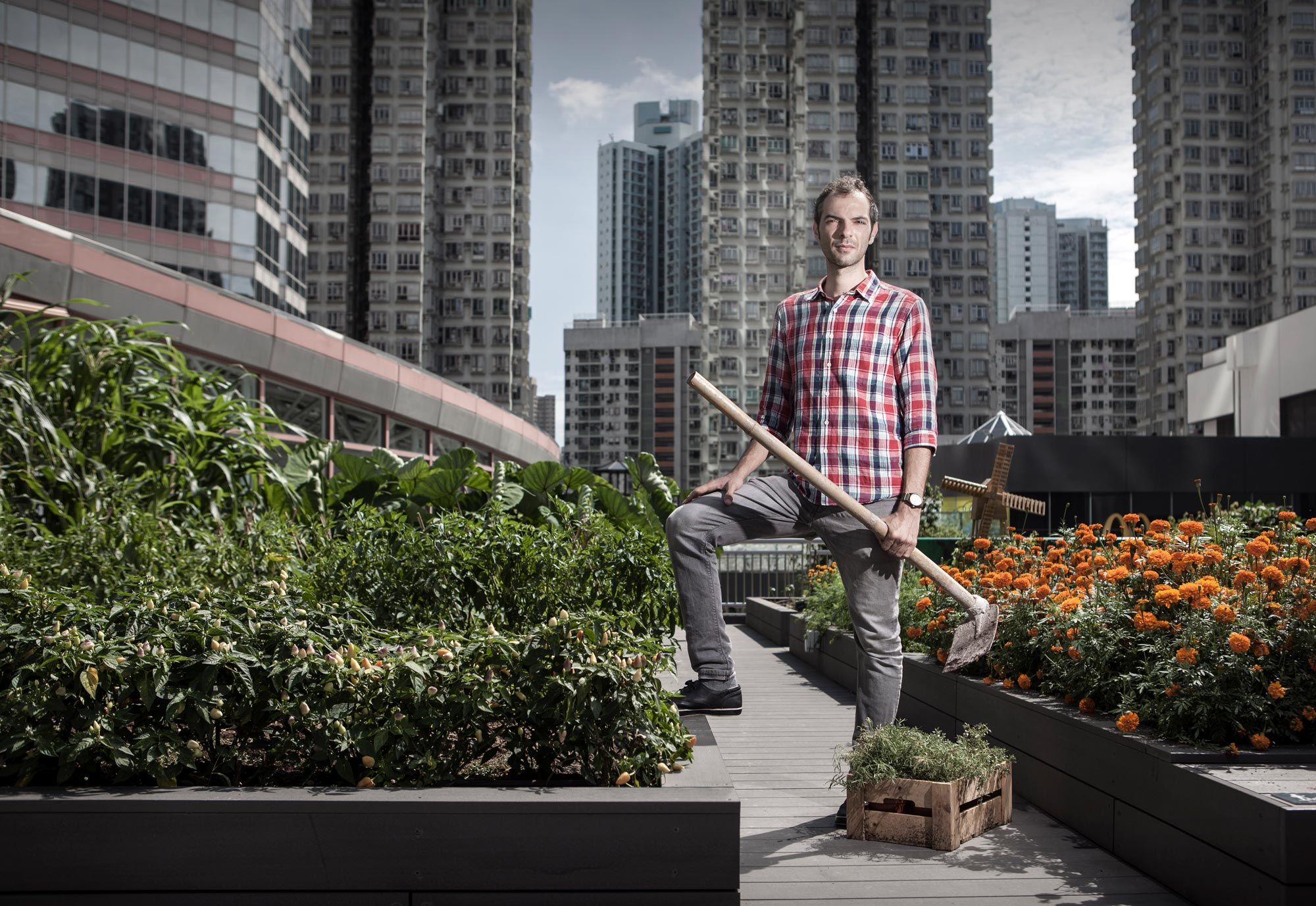
A new generation is putting increasing emphasis on health, good food and sustainability—so why are we still so reliant on mass agriculture? Rooftop Republic co-founder Pol Fàbrega wants to change the way we eat
Pol Fàbrega had a lightbulb moment when he moved to Hong Kong in 2011. After a childhood in Barcelona and an early adulthood in spent in the UK, Germany, France and Cambodia, he was accustomed to seasonal cooking and the taste of ripe fruit and vegetables still warmed from the sun. Hong Kong’s bland supermarket-bought goods came as something of a shock.
“In Barcelona, there is a very different way of eating to Hong Kong,” he says. “We go to markets and buy our produce from farmers who are based near the city. Just down the road from where my parents live is a guy selling vegetables picked that morning. They have a connection to him, know and trust his farming methods, and eat only what’s in season.”
I never thought I would become a farmer in one of most densely populated places on earth
— Pol Fàbrega
By contrast, Hong Kong’s supermarket culture means produce has either traversed the globe to arrive at your fridge or has been grown using harmful pesticides in Mainland China. Fàbrega decided there must be a better solution—but what? City slickers don’t have the time, space, inclination or know-how to start toiling on farms outside urban hubs.
“Those of us who live in cities, which is most of us, don’t even realise how much more delicious fresh produce is supposed to be,” says Fàbrega. “Visually, produce on supermarket shelves looks perfect, but that’s not the point. While that ugly tomato from home is misshapen, it tastes incredible. That’s because mass-farmed tomatoes are picked when green and ripened en route so the taste is inevitably watery and bland.”
The solution, Fàbrega decided, lay right above our heads. Together with his business partners, he founded Rooftop Republic, which creates farming space for vegetables, herbs and fruit on roof terraces around the city. Since it was launched in 2015, the social enterprise has been rapidly gaining ground, converting more than 40,000sqft of underused urban space in Hong Kong into more than 40 rooftop farms.
GREEN THUMB
“I knew nothing about agriculture when I moved here,” he says with a laugh. “I didn’t study it or grow up on a farm, and I certainly never thought I would become an urban farmer in one of most densely populated places on earth. But I’ve always been fascinated by social entrepreneurship, so I started playing with the idea of organic farming with my co-founders. Together, we decided we must be able to bring farming to the heart of city. It basically started as a passion project and then became an obsession of mine.”
The obsession paid off. Businesses around Hong Kong, from schools and universities to illustrious establishments such as the Landmark Mandarin Oriental Hong Kong, are all building and designing farms with Rooftop Republic. Certain private individuals are even getting involved. And we understand why—take one look at Rooftop Republic’s website and you’ll find photos of verdant rows of healthy plants surrounded by glittering skyscrapers and flourishing under the hot Hong Kong sun.
“We want to make urban farming part of our lifestyle,” Fàbrega explains. “That way, we turn it from something exceptional into something commonplace. Instead of popping to the shops to get your lettuce or herbs, you just walk upstairs. Once you have the right soil and seeds, the rewards are incredible.”
WIDE-RANGING INTERESTS
Everyone has different motivations for getting involved with Rooftop Republic. For some, it is about taste and growing a piece of basil, oregano or lettuce that has so much flavour, it barely needs salad dressing. For others, it is about the environment and putting an end to food miles, or about saving on the cost of marked-up goods that have been flown in from another hemisphere.
“All our clients have their own reasons,” he says. “For the Landmark Mandarin Oriental, it was about pushing for greater sustainability and trying to become a zero-waste kitchen. They are trying to source as much as possible that is organic and locally produced.”
I actually took some children to see an urban farm and one boy thought the goat was a unicorn—that’s how removed they are from farming, that they think something in our food chain is a magical beast
— Pol Fàbrega
“For corporates, it tends to be about social responsibility,” Fàbrega continues. “But for schools, it’s about the kids’ health and allowing them to be the first generation in Hong Kong in years to participate in the growing of their own food. I actually took some children to see an urban farm and one boy thought the goat was a unicorn—that’s how removed they are from farming, that they think something in our food chain is a magical beast.”
CLEAN EATS
Knowing your vegetables are clean and pesticide-free is also a driving factor for many Hongkongers. And while we can be sure Rooftop Republic goods haven’t been tainted with chemicals, what about pollution?
“Given that most supermarket food comes from the Mainland, I can guarantee ours is healthier than that,” says Fàbrega. “From research, we think air pollutants remain at surface level, so you just have to wash it and it’ll be fine. I get my soil from the best suppliers and we grow our plants on raised beds with lots of natural fertilisers, so it’s as healthy as can be.”
And while Fàbrega may have started something revolutionary, he still has a long way to go, with 64 million sqft of empty rooftop space in Hong Kong crying out for a juicy tomato plant or a row of crisp lettuces.
“We’re getting there,” he says. “Finding the right talent is the biggest challenge. Hong Kong used to produce most of its own food, but once manufacturing jobs moved across the border, younger generations stopped learning about farming, so finding qualified staff isn’t easy. But we’re working on it.”
And his reward for all that hard work is four months of all his favourite foods. From November until March, Hong Kong’s cold season, Fàbrega grows cabbage, lettuce, beetroot, kale, herbs and broccoli on his roof. “I love knowing all those delicious vegetables are waiting for me,” he says. “It makes me look forward to dinner—even more than usual.”
